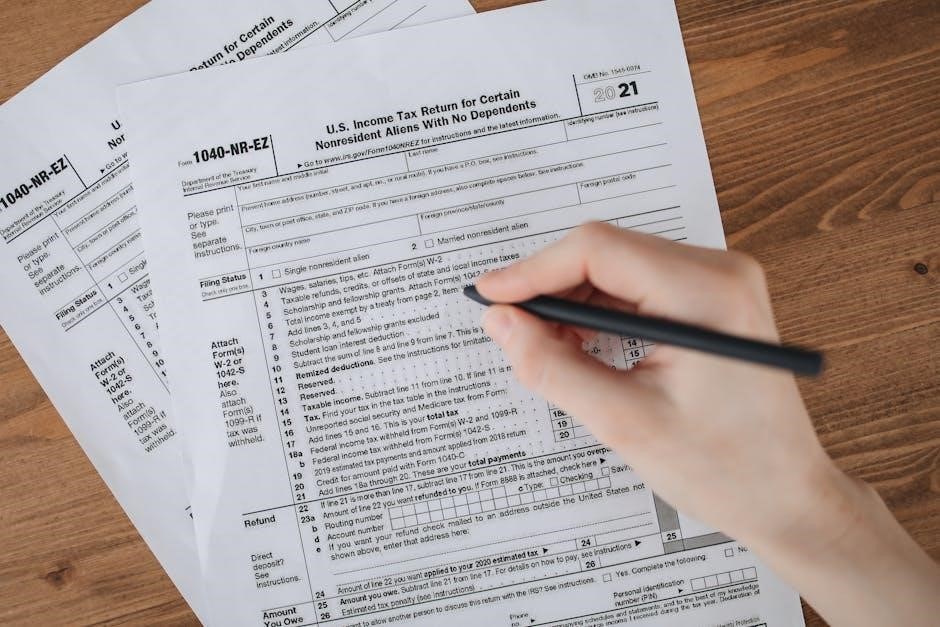475 tax deductions for home-based business pdf
Discover essential tax savings strategies with Bernard Kamoroff’s guide, covering home office deductions, utilities, and more. Updated tax laws help maximize deductions for home-based businesses, ensuring compliance and accuracy with proper documentation.
Overview of the 475 Tax Deductions Guide
The 475 Tax Deductions for Businesses and Self-Employed Individuals guide, authored by Bernard B. Kamoroff, offers a comprehensive A-to-Z listing of tax write-offs tailored for home-based businesses. Updated to reflect the latest tax law changes, it includes a dedicated chapter on home-based businesses, ensuring readers are informed about deductions specific to their needs. The guide covers essential topics such as home office deductions, utilities, property taxes, and maintenance costs, providing practical advice to maximize tax savings. Available in multiple formats, including PDF, it serves as an invaluable resource for entrepreneurs seeking to navigate complex tax rules and ensure compliance. This 248-page guide is published by Globe Pequot and is now in its 12th edition, making it a trusted reference for self-employed individuals and small business owners.
Importance of Tax Deductions for Home-Based Businesses
Tax deductions are crucial for home-based businesses as they significantly reduce taxable income, lowering overall tax liability. By deducting expenses like mortgage interest, utilities, and maintenance, business owners can retain more profits. Accurate documentation and understanding of IRS requirements ensure compliance, avoiding audits. These deductions also help level the playing field, allowing small and home-based businesses to compete effectively. Proper utilization of tax write-offs can lead to substantial savings, reinvested into business growth. Bernard Kamoroff’s guide provides detailed insights, helping entrepreneurs maximize deductions and navigate tax complexities with confidence, ensuring they don’t overpay taxes and maintain financial stability.
Key Concepts in Tax Deductions for Home-Based Businesses
Understanding home office deductions, business use percentage, and IRS requirements is vital for maximizing tax savings. Proper documentation ensures compliance and unlocks eligible write-offs effectively.
Understanding Home Office Deductions
Home office deductions allow you to deduct a portion of home expenses, such as mortgage interest, property taxes, utilities, and maintenance, based on the percentage of your home used for business. This deduction is essential for home-based businesses, as it can significantly reduce taxable income. The IRS requires that the space be used regularly and exclusively for business to qualify. Proper documentation, including records of business use and expenses, is crucial for claiming this deduction. By understanding these rules, home-based businesses can ensure they maximize their tax savings while maintaining compliance with IRS regulations. Accurate calculation and documentation are key to avoiding audits and ensuring eligibility.
Calculating Business Use Percentage of Your Home
To calculate the business use percentage of your home, you can use the square footage method or the time-based approach. Measure the area dedicated to your business and divide it by your home’s total square footage. Alternatively, track the time spent on business activities in a multipurpose space and apply that percentage. Accurate records are essential to support your calculations. The IRS requires documentation to verify the business use percentage, ensuring compliance and avoiding disputes. This step is crucial for claiming deductions accurately and maximizing tax savings. Proper calculation ensures you only deduct eligible expenses, aligning with IRS guidelines for home-based businesses.

IRS Requirements for Qualifying Home-Based Business Deductions
To qualify for home-based business deductions, your workspace must be used regularly and exclusively for business. The IRS requires documentation proving the space is dedicated solely to business activities. Calculate the business use percentage using methods like the square footage of the business area divided by the home’s total square footage. Keep detailed records, including measurements and business use logs, to support your claims. The IRS also mandates that the space must be the principal place of business or where you meet clients. Proper documentation ensures compliance and avoids disputes. Failure to meet these requirements may result in denied deductions. Accurate records and adherence to IRS guidelines are essential for securing eligible tax benefits.
Common Tax Deductions for Home-Based Businesses
Home-based businesses can deduct mortgage interest, property taxes, utilities, maintenance, and insurance. These expenses are proportionate to the business use percentage of the home.
Utilities and Maintenance Costs
Home-based businesses can deduct utilities and maintenance costs proportional to the business use percentage of their home. This includes electricity, gas, water, and internet expenses directly related to the business area. For example, lighting and heating used in the home office are deductible. Maintenance costs like plumbing or HVAC repairs specific to the business space also qualify. However, personal use portions of these expenses are not deductible. Accurate records of utility bills and repair receipts are essential to support these deductions during tax filings. Proper documentation ensures compliance with IRS requirements, maximizing allowable deductions for home-based businesses. This section focuses solely on utilities and maintenance, excluding other deductible expenses covered elsewhere.
Property Taxes and Mortgage Interest
Home-based businesses can deduct a portion of property taxes and mortgage interest as business expenses. These deductions are based on the percentage of the home used exclusively for business purposes. For example, if 20% of your home is dedicated to your business, you can deduct 20% of your property taxes and mortgage interest. This applies to both renters and homeowners. However, personal use areas do not qualify for these deductions. Accurate records, such as mortgage statements and property tax bills, are essential to support these deductions. This section focuses solely on property taxes and mortgage interest, providing clear guidance on how to calculate and claim these expenses effectively for home-based businesses. Proper documentation ensures compliance with IRS rules and maximizes allowable deductions.
Insurance Premiums for Home-Based Businesses
Home-based businesses can deduct a portion of their insurance premiums as business expenses. This includes homeowners’ or renters’ insurance premiums allocated to the business use percentage of the home. For instance, if 30% of your home is used for business, you can deduct 30% of your insurance costs. However, personal insurance costs remain non-deductible. Additionally, businesses may deduct premiums for liability or business-specific insurance policies. Accurate records and proper documentation are crucial to support these deductions. This section focuses on insurance premiums, providing detailed guidance on how to calculate and claim these expenses effectively for home-based businesses, ensuring compliance with IRS regulations and maximizing allowable deductions without overlap with other expense categories. Proper allocation ensures accurate tax savings.
Repairs and Renovations for Business Use
Repairs and renovations for business use can be deductible expenses for home-based businesses. These expenses must be directly related to the business use of your home. For example, if you repair or renovate the area dedicated to your business, such as a home office, the cost can be partially deducted based on the business use percentage. However, personal repairs or renovations not related to business activities are not deductible. It’s important to maintain clear records of these expenses and ensure they meet IRS guidelines. Proper documentation is key to supporting these deductions and avoiding potential issues during tax audits. This section focuses solely on repairs and renovations, providing guidance on what qualifies and how to calculate the deductible portion accurately for home-based businesses, ensuring compliance with tax regulations and maximizing allowable deductions without overlap with other expense categories. Proper allocation ensures accurate tax savings.

Maximizing Your Tax Savings
Maximize tax savings by accurately calculating business use percentages, maintaining detailed records, and leveraging deductions like home office expenses, utilities, and repairs specific to business use areas.
Strategies for Claiming Maximum Deductions
To claim maximum deductions for your home-based business, focus on accurate calculations of business use percentages and maintain thorough documentation. Deductions like utilities, property taxes, and mortgage interest can significantly reduce taxable income. Regularly review and update records to ensure compliance with IRS requirements. Consider consulting a tax professional to identify overlooked deductions and optimize your return. Staying informed about tax law changes, such as those highlighted in Bernard Kamoroff’s guide, ensures you leverage all eligible expenses. By strategically organizing expenses and understanding special rules for home-based businesses, you can maximize savings and avoid costly errors.
Documentation and Record-Keeping Best Practices
Accurate and detailed documentation is crucial for claiming home-based business deductions. Maintain records of all business-related expenses, including receipts, invoices, and bank statements. Track the percentage of your home used for business purposes through logs or calendars. Regularly update your records to reflect changes in business use or home improvements. Use digital tools or spreadsheets to organize expenses by category, such as utilities, repairs, and insurance. Keep copies of tax returns and supporting documents for at least three years. Ensure records clearly distinguish between personal and business use of your home. Proper documentation not only supports your deductions but also helps in case of an IRS audit. Stay organized and consistent to avoid missing eligible deductions and ensure compliance with IRS requirements.

Additional Considerations
Explore additional deductions like internet costs, office supplies, and software. Special rules apply to self-employed individuals, ensuring accurate tax reporting and maximum savings for home-based businesses.
Other Business Expenses That Are Deductible
Beyond home-related costs, various business expenses are deductible, such as office supplies, software, professional fees, and shipping costs. These expenses can significantly reduce taxable income. The 475 Tax Deductions guide highlights items like internet domain name costs and theft losses as deductible. For home-based businesses, these expenses must be solely for business use. Accurate documentation is crucial to support these deductions. The guide also emphasizes staying updated on tax law changes to ensure compliance. By carefully tracking and categorizing these expenses, home-based businesses can maximize their tax savings and maintain financial health. Proper record-keeping and understanding of deductible items are essential for avoiding audits and optimizing tax outcomes.
Special Rules for Self-Employed Individuals
Self-employed individuals operating home-based businesses must adhere to specific IRS rules to claim deductions. The home office deduction is a key benefit, requiring an exclusive workspace used regularly for business. Expenses like utilities and insurance can be deducted based on business use percentage. However, deductions cannot exceed business income, with excess carried forward. Accurate documentation is vital to avoid audits. The 475 Tax Deductions guide outlines these rules, ensuring compliance and maximizing savings. Proper record-keeping and understanding of IRS guidelines are essential for self-employed individuals to navigate tax complexities effectively and maintain financial stability while running a home-based business.
Consulting a Tax Professional for Home-Based Businesses

Consulting a tax professional is crucial for home-based businesses to navigate complex tax laws and maximize deductions. A tax expert can provide personalized advice tailored to your business needs, ensuring compliance with IRS rules. They can help identify eligible deductions, such as home office expenses and utility costs, while avoiding common pitfalls. Tax professionals stay updated on law changes, enabling them to optimize your financial strategy. Their expertise ensures accurate documentation and reduces the risk of audits. By leveraging their knowledge, home-based businesses can achieve significant tax savings and maintain financial stability. Investing in professional guidance is a wise decision for long-term success and peace of mind.
